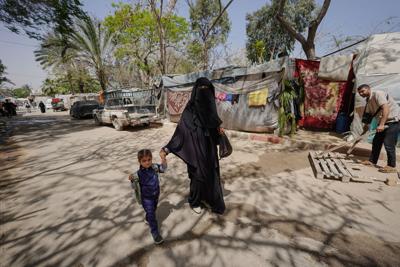Seven months into the Israel-Hamas conflict, is it Israel vs. the World?
In the court of public opinion, the intensity and potential ramifications from the matter of World v. Israel have stunned the Jewish state and those who stand by it.
Updated May 17, 2024 at 4:03 p.m.
May 17, 2024
6 min read


It may be just a fuzzy memory of a fleeting moment now, but there was a time when the state of Israel had the world’s widespread sympathy.
It was seven months ago, in the early hours of Oct. 7, when the air was pierced by rocket fire and gunshots, the ground soaked with blood; when the fearful eyes and mangled bodies of some 1,200 dead Israelis and more than 200 hostages appeared on screens and in news feeds across the globe.
It was before the airstrikes and the ground invasion of the Gaza Strip; before the displacement of 1.7 million Palestinians; before the bulldozing of homes and the bombarding of hospitals, schools and bakeries; before electricity, water and aid supplies were cut; before the famine conditions set in.
In that moment, Israel was a victim in the eyes of much of the world.
“Our hearts break for the hundreds of innocent people whose lives were senselessly taken,” Prime Minister Justin Trudeau said on Oct. 8, part of the chorus of sympathetic statements issued from world capitals as the terrible impact of the Hamas attack came clear.
“To our Israeli friends, Canada stands with you … Our support for the Israeli people is steadfast.”
Seven months and tens of thousands of deaths later, Israel stands accused of conducting genocide against the Palestinians. Its government is braced for a war crimes indictment. Its economy is negotiating the fallout of trade boycotts. Its military is working around weapons embargoes, including from Canada, which halted transfers over human rights concerns. Israelis and Israeli institutions are targeted for worldwide protests, from university campuses to kitschy televised singing competitions.

In the court of public opinion, the intensity and potential ramifications from the matter of World v. Israel have stunned the Jewish state and those who stand by it.
“You have to talk to them to appreciate it,” said Ilan Berman, senior vice president of the American Foreign Policy Council. “The entire world is on the humanitarian issue. Every Israeli is still on the afternoon of Oct. 7 because you have the echoes of the Holocaust, because you have this national societal trauma.
“There is this sense of atomization on the part of the Israelis, that the world doesn’t really understand us.”
That it happens in a forum like the United Nations General Assembly, which last week voted overwhelmingly to grant Palestine’s UN delegation all the powers of a full-fledged country except for the right to vote, is one thing.
In an incendiary speech before the vote, Israeli UN Ambassador Gilad Erdan said many of those pushing for Palestinian powers were simply “Jew-hating.” In reality, Israel long ago abandoned hope of getting what it sees as a fair hearing on that particular world stage.
That it happened in Washington, where U.S. President Joe Biden earlier this month halted delivery of 3,500 bombs to Israel for fear that they would be used in a controversial invasion of the southern Gaza city of Rafah, where many displaced Palestinians have taken refuge, is another.
“The United States and the west — including Canada — went to war. They went to Afghanistan, they went to Iraq, and they killed hundreds of thousands of people — most of them civilians,” said Eytan Gilboa, a professor of international communication at Tel Aviv’s Bar-Ilan University.
“Nobody said anything about civilian casualties and the need to negotiate and the need to provide humanitarian assistance. I never heard those arguments applied to the war against terrorism in Afghanistan and Iraq. Suddenly, all of that is forgotten.”
Claiming double standards and hypocrisy, though, is neither a robust legal defence nor a convincing political argument to overturn the foreign policies of countries that are now taking their distance from Israel.
Turkey earlier this month slapped a trade embargo on Israel, freezing a $7-billion relationship and is applying to join the South African case before the International Court of Justice alleging that Israel has breached the 1948 Genocide Convention.
“As Muslims it is out of the question for us to stay silent on this,” Turkish President Recep Tayyip Erdoğan said.
Spain’s government rejected a permit this week for an Israel-bound ship to stopover in the port of Cartagena because it was carrying 27 tons of explosives, with Foreign Minister José Manuel Albares saying: “The Middle East does not need more weapons, it needs more peace.”
And Ireland, along with several other countries, will later this month formally recognize the state of Palestine, a move intended to promote a two-state solution to the Israeli-Palestinian conflict and also “to send a signal to the Palestinian population at large that we support the right of self-determination,” said Michael Martin, Irelands’s minister of defence and foreign affairs.
He cast Israel as something of a rogue state, particularly after ignoring repeated calls to halt a military invasion of Rafah.
“The suffering is immense. The death and destruction is immense and people want it to stop. The international community wants it to stop, and I believe Israel is oblivious.”
In fact, Israel’s leaders are keenly aware of the country’s growing isolation.
In a May 5 speech to mark Holocaust Remembrance Day, Israeli Prime Minister Benjamin Netanyahu said that no amount of international pressure will stop Israel from defending itself against what it sees as an existential threat from Palestinian militant groups and other states and groups committed to destroying the Jewish state.
“If Israel is forced to stand alone, we will stand alone, and will continue to smite our enemies until we achieve victory,” he said.
What makes for a compelling line in a political speech, does not, however, make for sound governance. Netanyahu’s “victory” promises to extend and inflame the conflict at the price of further loss of life. And making such a vow over the objections of Israel’s critics could further undermine the standing of Netanyahu and his country.
That was the warning of Roy Schondorf, Israel’s former deputy attorney general in charge of international law, in an op-ed recently published by the Hebrew-language Yedioth Aharonot newspaper about the risks of the International Criminal Court issuing arrest warrants for Netanyahu and other political and military leaders for war crimes.
It is a threat, he wrote, that should be viewed with “the utmost seriousness,” not only because it could see them face trial in The Hague but because of the potential diplomatic, military and economic fallout.
“Israel is not a global power. Our security system is not omnipotent. A decision to cease to sell us weapons, or to refrain from cooperating with us on security matters, is not simply a minor inconvenience,” Schondorf wrote, adding that trade embargoes on Israel could also sink the country’s high standard of living.
“The effects would undoubtedly be felt by every citizen.”

In laying siege to Gaza, bombarding its buildings and infrastructure, and killing between 30,000 and 35,000, according to the competing estimates of Israel and the Palestinian Ministry of Health, Israel’s critics say it is inevitable and just that the country now finds itself on the hot seat.
But Israeli observers, and some foreign policy experts, say the Jewish state’s woes have been made worse by an avoidable failure of communications.
“We are seven months into this conflict. The Israelis, in terms of messaging, should be doing better,” said Berman, of the American Foreign Policy Council.
As an example, Berman said that Israel has not offered any substantial proof to support its contention that the Palestinian war casualty figures that have been publicized and forwarded to the world via the United Nations are incorrect. Neither has Israel adopted transparency measures like embedding journalists with its military units to better illustrate what is says are the complexities of fighting against Hamas militants it accuses of hiding amidst the civilian population and violating the laws of war.
“The war is being seen in many quarters as this oppressor-versus-oppressed paradigm and it uncritically assigns virtue to the oppressed and villainy to the oppressor,” Berman said. “It’s a simplistic narrative, but if you want to break that narrative you have to do it with data.”
Gilboa said that Israel has dismantled public diplomacy programs intended to boost Israel’s image and nurture strategic relationships. But the current public backlash in the west has exposed even those diplomatic outreach efforts as a failure.
“Israel has been focusing on leaders, on members of Parliament, but not enough on the public,” he said. “You see so much ignorance today of people who have no idea what they are talking about. They don’t know what Hamas is. They talk about slogans such as ’From the river to the sea,’ but if you ask them which river and which sea.’ They have no idea at all.”
The other big unanswered question for Israel is whether this is a temporary state of affairs or a new geopolitical normal. The answer depends on what happens in the weeks and months ahead.
Will the outrage seen on American college campuses this spring last into the fall? Will the chilly White House reception thaw after November’s presidential election? Will Netanyahu’s right-wing coalition crumble, bringing another leader to power? Would another Israeli leader do things differently? Will Israel and Hamas reach a ceasefire deal to release hostages for prisoners, to rebuild Gaza, to find some path to a lasting peace?
Or is it, as Hagi El-Ad, the former head of Israeli human rights group B’Tselem wrote this week, too late?
“We’re approaching that moment, and perhaps it’s already here, when the memory of the Holocaust won’t stop the world from seeing Israel as it is,” he wrote in the Israeli newspaper Haaretz.
“The moment when historic crimes committed against our people will stop serving as our Iron Dome, protecting us from being held to account for crimes we are committing in the present against the nation with which we share the historical homeland.”

Allan Woods is a Paris-based staff reporter for the Star. He covers global and national affairs. Follow him on Twitter: @WoodsAllan.
Seven months into the Israel-Hamas conflict, is it Israel vs. the World? (thestar.com)

Leave a Reply
You must be logged in to post a comment.